九年级英语全册 Unit 9 When was it invented学案
- 格式:doc
- 大小:139.50 KB
- 文档页数:9
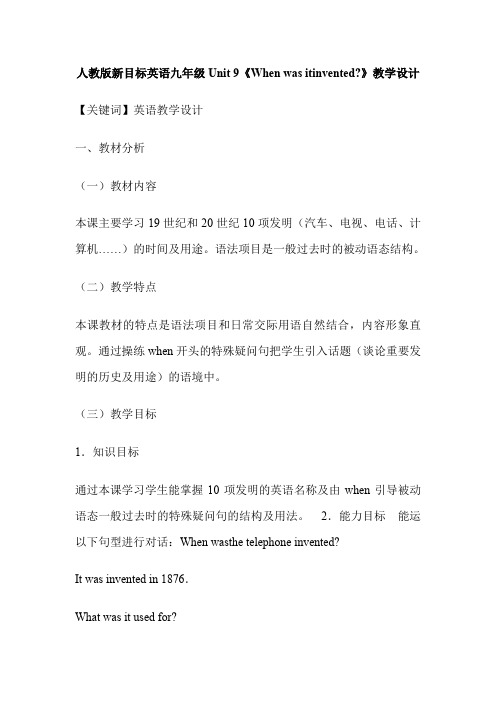
人教版新目标英语九年级Unit 9《When was itinvented?》教学设计【关键词】英语教学设计一、教材分析(一)教材内容本课主要学习19世纪和20世纪10项发明(汽车、电视、电话、计算机……)的时间及用途。
语法项目是一般过去时的被动语态结构。
(二)教学特点本课教材的特点是语法项目和日常交际用语自然结合,内容形象直观。
通过操练when开头的特殊疑问句把学生引入话题(谈论重要发明的历史及用途)的语境中。
(三)教学目标1.知识目标通过本课学习学生能掌握10项发明的英语名称及由when引导被动语态一般过去时的特殊疑问句的结构及用法。
2.能力目标能运以下句型进行对话:When wasthe telephone invented?It was invented in 1876.What was it used for?It was used for talking to people in other places.培养学生的观察、分析能力,快速反应能力,自学能力和用英语交流的能力。
3.德育目标教育学生爱学习,爱科学,开阔学生的思路,培养学生的创造精神。
(四)教学重点和难点重点:口头掌握本课核心句型When was the telephone invented?It was invented in 1876.What was it used for?It was used for talking to people in other places.难点:when引导被动语态一般过去时的特殊疑问句的结构及用法。
二、学习分析苏霍姆林斯基认为:“教给学生方法比教给学生知识更重要。
”建构主义是近年来介绍到我国的一种新兴教育理论,它认为知识不是通过教师传授得到,而是学习者在一定的情境即社会文化背景下,借助学习过程中其他人(包括教师和学习伙伴)的帮助,利用必要的学习资料,通过意义建构的方式获得的。
基于这样的认识,结合本课内容和初三年级学生的特点及学习经历,在教学中我侧重指导学生采用以下三种学习方法:1.合作学习法。
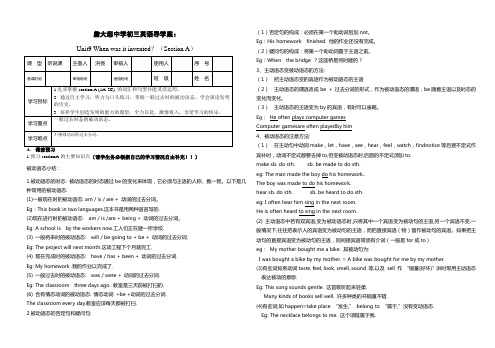
詹大悲中学初三英语导学案:Unit9 When was it invented?(Section A)A.课前预习1.预习sectionA的主要知识点(请学生务必根据自己的学习情况自由补充!!)被动语态小结:1.被动语态的时态: 被动语态的时态通过be的变化来体现,它必须与主语的人称、数一致。
以下是几种常用的被动语态:(1)一般现在时的被动语态: am / is / are + 动词的过去分词。
Eg:This book in two languages.这本书是用两种语言写的.(2)现在进行时的被动语态: am / is /are + being + 动词的过去分词。
Eg: A school is by the workers now.工人们正在建一所学校.(3) 一般将来时的被动语态: will / be going to + be + 动词的过去分词.Eg: The project will next month.这项工程下个月就完工.(4) 现在完成时的被动语态: have / has + been + 动词的过去分词.Eg: My homework .我的作业以完成了.(5) 一般过去时的被动语态: was / were + 动词的过去分词.Eg: The classroom three days ago. 教室是三天前被打扫的.(6) 含有情态动词的被动语态: 情态动词+be +动词的过去分词.The classroom every day.教室应该每天都被打扫.2.被动语态的否定句和疑问句:(1)否定句的构成:必须在第一个助动词后加not。
Eg:His homework finished. 他的作业还没有完成。
(2)疑问句的构成:将第一个助动词置于主语之前。
Eg:When the bridge ?这座桥是何时建的?3、主动语态变被动语态的方法:(1)把主动语态变的宾语作为被动语态的主语(2)主动语态的谓语改成be + 过去分词的形式,作为被动语态的谓语,be随着主语以及时态的变化而变化。
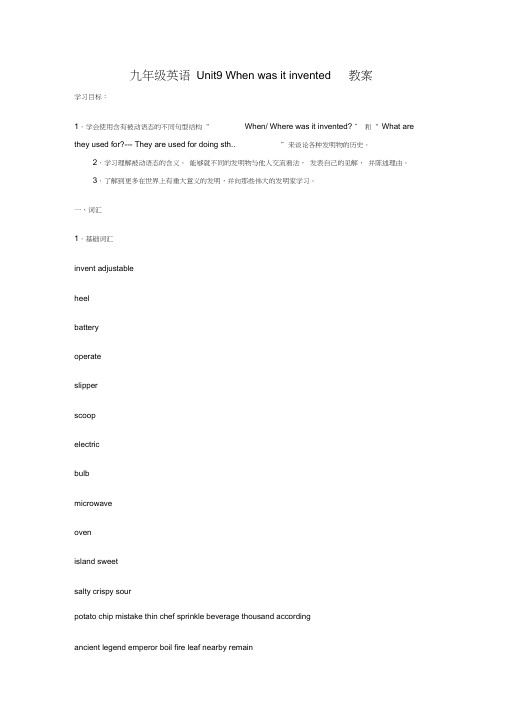
九年级英语Unit9 When was it invented 教案学习目标:1.学会使用含有被动语态的不同句型结构“When/ Where was it invented? ” 和“ What are they used for?--- They are used for doing sth.. ”来谈论各种发明物的历史。
2.学习理解被动语态的含义。
能够就不同的发明物与他人交流看法,发表自己的见解,并陈述理由。
3.了解到更多在世界上有重大意义的发明,并向那些伟大的发明家学习。
一、词汇1.基础词汇invent adjustableheelbatteryoperateslipperscoopelectricbulbmicrowaveovenisland sweetsalty crispy sourpotato chip mistake thin chef sprinkle beverage thousand accordingancient legend emperor boil fire leaf nearby remainnoticeproduce pleasantsmelltastemetalpiebakery throwspecialabacuscenturytelescopecameraterm2.重点短语experience airplane Indiadevelop二、日常用语1. --- When was the car invented---It was invented in 1985.2. ---When were electric slippers invented ?---They were invented last year.3. ---Who were they invented by ?---They were invented by Julie Thompson.4. ---What are they used for ?---They ' re used for seeing in the dark.三、知识讲解Section A:1. 被动语态谓语动词的语态表示句子的主语和谓语动作之间的关系:1)当句子的主语是谓语动作的执行者时,主、谓之间的关系称为主动语态;2)当句子的主语是谓语动作的承受者时,主、谓之间的关系称为被动语态。
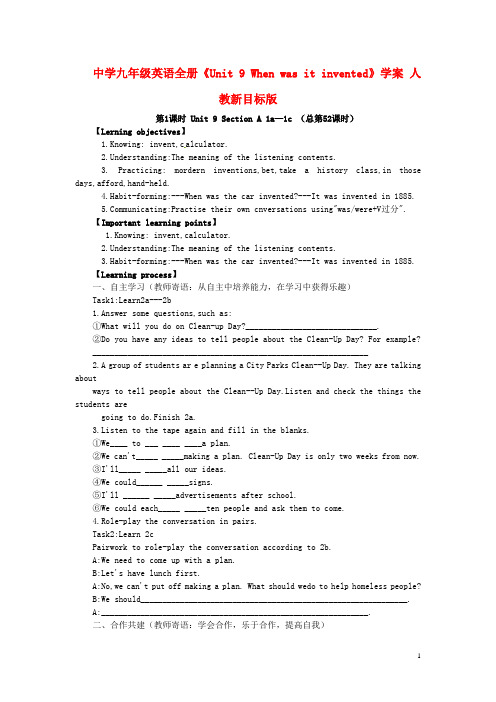
中学九年级英语全册《Unit 9 When was it invented》学案人教新目标版第1课时 Unit 9 Section A 1a—1c (总第52课时)【Lerning objectives】1.Knowing: invent,c alculator.2.Understanding:The meaning of the listening contents.3. Practicing: mordern inventions,bet,take a history class,in those days,afford,hand-held.4.Habit-forming:---When was the car invented?---It was invented in 1885.municating:Practise their own cnversations using"was/were+V过分".【Important learning points】1.Knowing: invent,calculator.2.Understanding:The meaning of the listening contents.3.Habit-forming:---When was the car invented?---It was invented in 1885.【Learning process】一、自主学习(教师寄语:从自主中培养能力,在学习中获得乐趣)Task1:Learn2a---2b1.Answer some questions,such as:①What will you do on Clean-up Day?______________________________.②Do you have any ideas to tell people about the Clean-Up Day? For example?_______________________________________________________________2.A group of students ar e planning a City Parks Clean--Up Day. They are talking aboutways to tell people about the Clean--Up Day.Listen and check the things the students aregoing to do.Finish 2a.3.Listen to the tape again and fill in the blanks.①We____ to ___ ____ ____a plan.②We can't_____ _____making a plan. Clean-Up Day is only two weeks from now.③I'll_____ _____all our ideas.④We could______ _____signs.⑤I'll ______ _____advertisements after school.⑥We could each_____ _____ten people and ask them to come.4.Role-play the conversation in pairs.Task2:Learn 2cPairwork to role-play the conversation according to 2b.A:We need to come up with a plan.B:Let's have lunch first.A:No,we can't put off making a plan. What should wedo to help homeless people?B:We should_____________________________________________________________.A:_____________________________________________________________.二、合作共建(教师寄语:学会合作,乐于合作,提高自我)翻译下列句子,注意划线部分的含义①We need to come up with a plan._________________________________.②We can't put off making a plan. Clean-Up Day is only two weeks from now.________.③I'll write down all our ideas.__________________________.④We could put up signs.______________________________.⑤I'll hand out advertisements after school.______________________.⑥We could each call up ten people and ask them to come.________________________.三、系统总结(教师寄语:只有不断总结与归纳,才会更系统更全面)1.总结need的用法并举例说明①作为实义动词:____________________举例说明________________________②作为情态动词:_____________________举例说明_______________________2.理解由from构成的短语的含义:from now________from now on_______be from___from then on________from---to--_______be different from______be far away from_____come from________hear from______e up with(同义短语)_____hand out(反义短语)____call up(同义短语)___四、诊断评价(教师寄语:相信自己,永不放弃)(一)根据汉语提示完成句子1.I'll help________(清扫) the city park.2.We can't___________(推迟制订计划).3.I'd like to__________________(鼓舞)the sick kids.4.We're going __________(建立) a food bank to help hungry people.5.You could__________(分发食物) at a food bank.6.We need_________________________(想出) a plan7. These words are all very important. ________________(把…写下来), please!8.He also_________(张贴)some signs asking for old bikes(二)选择正确答案。
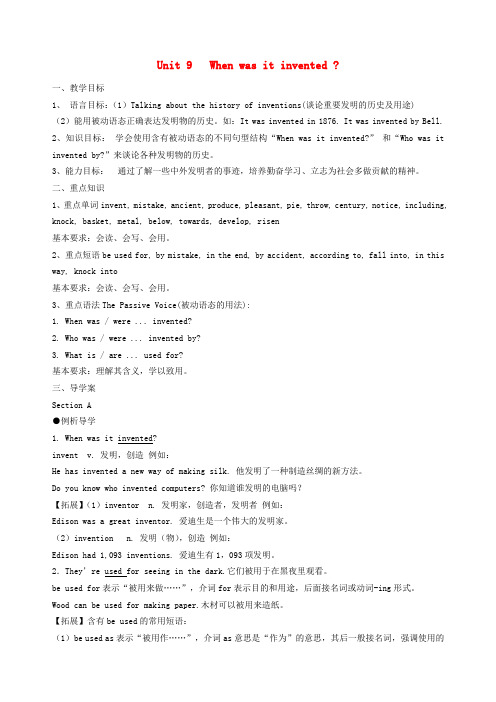
Unit 9 When was it invented ?一、教学目标1、语言目标:(1)Talking about the history of inventions(谈论重要发明的历史及用途)(2)能用被动语态正确表达发明物的历史。
如:It was invented in 1876. It was invented by Bell.2、知识目标:学会使用含有被动语态的不同句型结构“When was it invented?” 和“Who was it invented by?”来谈论各种发明物的历史。
3、能力目标:通过了解一些中外发明者的事迹,培养勤奋学习、立志为社会多做贡献的精神。
二、重点知识1、重点单词invent, mistake, ancient, produce, pleasant, pie, throw, century, notice, including, knock, basket, metal, below, towards, develop, risen基本要求:会读、会写、会用。
2、重点短语be used for, by mistake, in the end, by accident, according to, fall into, in this way, knock into基本要求:会读、会写、会用。
3、重点语法The Passive Voice(被动语态的用法):1. When was / were ... invented?2. Who was / were ... invented by?3. What is / are ... used for?基本要求:理解其含义,学以致用。
三、导学案Section A●例析导学1. When was it invented?invent v. 发明,创造例如:He has invented a new way of making silk. 他发明了一种制造丝绸的新方法。
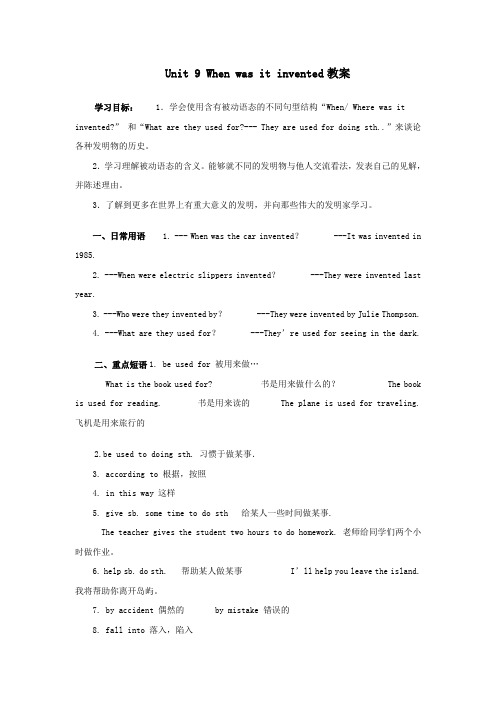
Unit 9 When was it invented教案学习目标:1.学会使用含有被动语态的不同句型结构“When/ Where was it invented?” 和“What are they used for?--- They are used for doing sth..”来谈论各种发明物的历史。
2.学习理解被动语态的含义。
能够就不同的发明物与他人交流看法,发表自己的见解,并陈述理由。
3.了解到更多在世界上有重大意义的发明,并向那些伟大的发明家学习。
一、日常用语 1. --- When was the car invented? ---It was invented in 1985.2. ---When were electric slippers invented?---They were invented last year.3. ---Who were they invented by?---They were invented by Julie Thompson.4. ---What are they used for?---They’re used for seeing in the dark.二、重点短语1. be used for 被用来做…What is the book used for? 书是用来做什么的?The book is used for reading. 书是用来读的The plane is used for traveling. 飞机是用来旅行的2.be used to doing sth. 习惯于做某事.3. according to 根据,按照4. in this way 这样5. give sb. some time to do sth 给某人一些时间做某事.The teacher gives the student two hours to do homework. 老师给同学们两个小时做作业。
九年级英语Unit 9 hen as it invented教案九年级英语Unit9henasitinvented 教案语言点归纳被动语态被动语态表示句子的主语是谓语动词所表示的动作承受者。
被动语态基本结构:be+及物动词的过去分词被动语态中的be是助动词,有人称、数和时态的变化。
一般现在时被动语态为:a/is/are+ 过去分词一般过去时被动语态为:as/ere+过去分词与情态动词连用的被动语态:情态动词+be+过去分词被动语态中动作的发出者或执行者做介词b的宾语,放在句末,b表示“由,被”的意思如何理解被动语态?为取胜更清晰、更深刻地理解被动语态的含义,可以将主动语态和被动语态的句子结构进行比较。
主动语态:主语+谓语动词+ 宾语+其他成分被动语态谨+be+过去分词+其他成分如:an peplespeaEnglish被动语Englishisspenban peple2本单元要掌握的句型觅P69中的GraarFus 3inventv 发明inventrn 发明家inventin n 发明可数询4beusedfrding 用来做 (I)Pensareusedfrriting 笔是用来写的。
Pensaren 'tusedfreating 笔不是用来吃的。
给某人某梯givesthtsb如:Igaveapenthi 我给他一支笔。
givesbsthIgavehiapen 我给他一支笔。
6allda 整天7saltad咸的saltn盐8bistae错误地如:Ittheubrellabistae 我不小心拿错了雨伞9aesb/sth+形容词使…怎様Itadeehapp它使我高兴aesb/sth+ 名词让…做…Itadeelaugh 它让我魏Obaident意外偶然letherbaide ntatbusstp我在公共汽车站意外地见到了她1nt ■■ - until…直到…才做…如: Ididn 'tgtbeduntillfinishedr我直到完成我的工作才去睡觉。
2013-2014第一学期初中英语电子备课主题单元教学设计表单元标题Unit 9 When was it invented?学校年级九年级主备教师联系电话复备教师联系电话备课项目分值设计区域备课标与教材单元5分课标与教材(单元)的联系。
1、听:能提取“发明物、发明人、发明时间、发明物用途等”信息;能记录相关信息。
2、说:能询问、提供“发明人、发明时间、发明物用途等”信息,表达“最有用发明”观点;3、读:能运用skim\scan\careful reading阅读策略,从3a中获取what\when\who\how的相关信息,从reading中获取地点、用途、装置等信息。
能正确、连贯、流畅地朗读课文。
4、写:能写出(From pie plate to flying disk)的短文;5、理解和领悟本单元词语的基本含义,使用这些词汇描述the historyof inventions;了解被动语态的结构和表意功能;运用被动语态描述the history of inventions,学会被动句与主动句的转换;5分分析教材(单元)的重点和难点。
1、听:能提取“发明物、发明人、发明时间、发明物用途等”信息;能记录相关信息。
2、说:能询问、提供“发明人、发明时间、发明物用途等”信息,表达“最有用发明”观点;3、读:能运用skim\scan\careful reading阅读策略,从3a中获取what\when\who\how的相关信息,从reading中获取地点、用途、装置等信息。
能正确、连贯、流畅地朗读课文。
4、写:能写出(From pie plate to flying disk)的短文;专题一5、理解和领悟本单元词语的基本含义,使用这些词汇描述the history of inventions;了解被动语态的结构和表意功能;运用被动语态描述the history of inventions;学会被动句与主动句的转换;专题划分专题一(听说课):(Section A第一、二课时)专题二(读写课):(Section B第三、四课时)专题三(阅读课):(第五课时)……备学情15分学生通过自学能够解决:会读Setion A的词汇,搜集某一发明物的图片(图片带有的信息:英文名称、发明人、发明时间)。
Unit 9 When was it invented?Section A 1a---1cⅠTeaching Ames and DemandsKnowledge Objects1.V ocabulary: invent calculator2.Target Language: When was it invented? It was invented in 1971.Ability Objects:1.Teach the students to use the new words.2.Train the students to narrate the history of the inventions by using The PassiveV oice.3.Train the students’ listening, speaking, reading and writing skills with the targetlanguage.ⅡTeaching Key Points1.Key V ocabulary: invent calculator2.Target Language: Talk about the history of the inventions.ⅢTeaching Difficult PointsUse The Passive V oice to narrate the history of the inventions.Remember the past participle.ⅣTeaching Methods:Task-based ApproachⅤTeaching ProceduresStep 1: GreetingsStep2: 1aShow the photos of Cai Lun and Edison to the students and teach “ invent/inventor/invention”.invent/inventor/invention 发明(动词)/发明家(名词)/发明(名词)E.g.Cai Lun invented paper.Paper is an invention.Cai Lun is an inventor.Ask Ss make sentences to describe Edison and bulb.Then teach “ was invented”.一般过去时的被动语态: was/were+过去分词,表示过去的被动的情况。
Unit9 When was it invented?第一课时1a-Grammar Focus一、词汇目标:1、invent v.发明,创造,invent- invented –invented- inventing n. inventor 发明者,发明家, invention 发明,eg: helpful inventions 有用的Edison was one of the greatest ______________, he had 1093 ___________ in his life.Light ___________________ by him.3、operate v.①操作,作业, operate the machine ,操作机器;battery-operated adj.电池供电的,eg: a battery-operated tennis racket,一个电池供电的网球拍;②做手术:operate on sb =have an operation on sb,给某人做手术;operator手术员,操作员4、slipper n.拖鞋, a pair of slippers,一双拖鞋;electric slippers电动拖鞋;battery-operat edslippers,电池供电的拖鞋;5、heat v.加热, heat the milk ,加热奶牛奶;heated adj.受热的,heated scoop 加热的勺子。
二、短语目标:1、 be used for sth/doing sth =be used to do sth. 被用来做……as…当。
用by sb 被某人用get/be used to sth/ doing sth 习惯于……used to do sth 过去常常干某事2、be madeFrom +材料由。
制造in sp (产地)在。
制造by sb (生产者)被。
人制造up of+成员、成分由。
组成into+产品被制成。
【巩固练习】1、Personal computers _____ in 1976.(invent)2、Light bulb are used for in the dark.(see)3、It’s __ for scooping really cold ice cream.(use)4、I need four ___ __ (battery) for my radio.5,The sick boy____________ to the hospital by the police yesterday.(take)6, They often clean their classroom after school.Their classroom _____ often ______ after school.7, I must repair the TV now.The TV must _____ _______ now.8, Chelsea Lanmon invented this kind of scoop.This kind of scoop _____ ____ ______ Chelsea Lanmon.9.When did you buy your motorbike?When ______ your motorbike _______?10,I saw him go into the library just now.He _____ _____ _____ go into the library just now.11, -Why didn’t you go to the party last night?-Because I __ A. wasn’t invited B. didn’tinvited C. haven’t invited12, Mum, I think we can buy a house _____ a swimming pool. A, with B, on C, in D, of13, A new scarf ______ her mother by her yesterday.A, bought for B, bought toC, was bought for D, was bought to14,I ____ to get there before seven tomorrow morning.A, told B, have told C, will tell D, was toldC. created; produced;D. produce; made15. The stones they carried were used ______ houses and bridges. A, to build B. for building C. to be built D. A and B16. The room ______ as a meeting room.A. used to being usedB. was used to be usedC. was used to being usedD. used to be used17. An expert(专家) once said that humans(人类)____ have serious problems in the future.A. wouldB. willC. shallD. going to第二课时3a-2c of Section B一、词汇目标:1、crispy adj.脆的crisp 薯片,salt- salty, taste –tasty, luck- luc ky2、sour adj。
酸的 go sour 变酸3、sprinkle v.撒,洒sprinkle A on B = sprinkle B with A 。
往B上撒A4、by mistake,错误地do sth by mistake误做某事Make mistakes,犯错误 Sorry, I took your book ________________.【巩固练习】1,Do you have any problems if you ______ this job?A, offer B, will offer C, are offered D, will be offered2, Waste paper shouldn’t _____ everywhere.A, be thrown B, throw C, is thrown D, are thrown3, It’s reported that more new buildings _____ here soon. A, will be built B, was built C, has built D, will build4,We didn’t take any umbrellas. So we had to wait ___ the rain stopped.A, after B, when C, until D, because5.This kind of apple ______ delicious. I want one more.A. is tastedB. tastesC. is tastingD. tasted6.Gilbert ____ electricity and Edison ____ the electric light bulb.A. discovered ; inven tedB. discovered; discoveredC. invented; inventedD. invented ; discovered7. _______ the following pictures, please write a composition. A. Thanks to B.Because of C. According to D. Instead of8. Before breakfast, they often climbed a ___ hill.A. nearlyB. nearbyC. nearD. by9.Can you tell me the ____ way to the station?A. more nearbyB. nearlyC. nearestD. most nearby10. My uncle will come ____ next month and he will stay here for _______ A. sometime ;some time B. some time; sometime C. sometimes ; some timeD. some time ; some times11. My letter ____ my parents this morning was ___ my study at school. A. for; on B.to; aboutC. for; aboutD. to; for12,The light bulb is one of the most important _______________(发明)13,The microwave ovens ______________________(用来热) the food.14,The radios ________________(发明) many years ago.15, The football team ______________________(组成) twenty people.16,He made me wait f or a year.(被动)I _____ ______ ______ _____ for a year.17, Teachers should ________________(听) by students.18,He ___________(tell) that his mother was badly ill.19. We __________(ask) not to be late for class again.第三课时3a of Section B and self check.一、词汇目标:1、beverage cn. (beverages) =drink3、remain v.=keep, stay ,保持,remain +adj/介词短语/n./doing sth.Years has passed, you still ________ young.4、notice v. notice sth注意到某人经常做某事或者已经做了某事 notice sb do sth=sb be noticed to do sth.注意到某人正在做某事 notice sb doing sthnotice that+句子Did you notice someone _______(touch) my things?He _____________(notice) running to the tall tree5、produce v. (production n)生产,产生,producer n.生产商Where__________ salt___________?(生产)6、pleasant adj. 令人愉快的,produce a pleasant smell,产生一股香味, please(v)使满意,pleased 感到满意的,pleasing 令人满意的We were all _______ to have the chance to take the _________ trip.7、mixture n.混合物 mix sth up 把……混合8、throw v.投扔 throw-threw-thrown, throw away 扔掉,throw about 到处乱扔9、invent v. 发明(本不存在,创造性地制造,从无到有) discover v. 发现(本来存在,但不为人所知)Do you know when the new America_______________?10、century n. 世纪= one hundred years ,in the twenty-first century 在二十一世纪In the 1950s 在二十世纪五年代二、短语:1、by accident偶然的2、fall –fell-fallenfall into …掉进……里off…从……掉下down 摔倒behind 落后,掉队in love with…爱上……asleep 睡着(1) He wasn’t careful ___________ the tree.(2) I’d work harder, or I’ll __________ you.(3) When first saw the house, I _______________ it.(4) As soon as I went to bed, I ___________3、sth be brought to sp 某物传入某地4、drinking water 饮用水【巩固练习】1、The flowers give out a smell.(please)2、Be careful of the water .It can burn you(boil)3、We can get (salty) from the sea, the lake or the well(井).4、The book is very (help)to you.5、Tea ___(invent)three __(thousand)years ago.6、Do yo u know who _______ the telephone?(invent)7、A number of problems ______ to be solved.(remain)8.Tom wasn’t careful enough, so he __________(掉进……里) the river.9,Tea _______________________(才被带到) the western world until 1610.10, Do you know what happened ____________________(十二世纪)?11,The ground ____________________(盖满) dead leaves.12, People celebrate spring festival_____________(用许多方法)13. I often notice the boy _________ school alone very late.(leave)第四课时Reading【学习目标】一、词汇目标:1、active adj.活跃的 n. activity 活动2、indoors adv.在室内outdoors在室外3、create v.创造,创作,adj. creative 有创造性的. creator n.创作者4、wooden adj.木质的 n. wood 木头, woods 小树林5、knock v.敲击,碰撞, knock on/ at the door 敲门,knock into sb.与某人相撞,knock sb down撞倒某人,6、divide v.分开,划分, divide …into …把……分成…,eg:①We divide Wuhan into three parts.②Our class is divided into thirteen groups.divide from…从……分离8、shoot v. 射击,投篮,shoot -shooting–shot –shot, shoot at …向……射击9、below prep.在……的下面,低于…, above在……上方,高于…, over 在……的正上方,under在……的正下方, on 在……的表面上10、guide v.指导,带领,n. our guide 导游,guide book 指南手册12、develop v.发展,成长,发达, developing- developed- developed ,develop education 发展教育, a developing country ,一个发展中国家,a developed country一个发达国家China is a _________ country. America is a __________ country. With the ___________of the world, China is ___________ quickly.13、popularity n.普及,流行,eg: The popularity of education with nine years has workedout fine in our country. 九年义务教育的普及在我国已经产生了良好的效果。